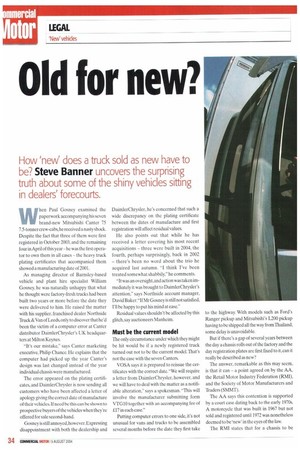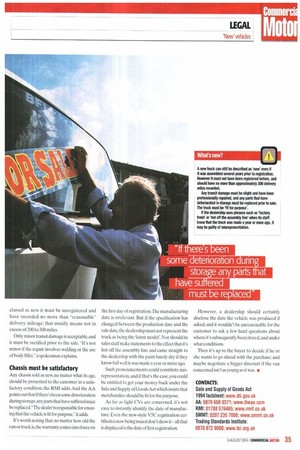Old for new?
Page 34

Page 37

If you've noticed an error in this article please click here to report it so we can fix it.
How 'new' does a truck sold as new have to
be? Steve Banner uncovers the surprising
truth about some of the shiny vehicles sitting in dealers' forecourts.
When Paul Gosney examined the paperwork accompanying his seven brand-new Mitsubishi Canter 75 7.5-tonner crew-cabs, he received a nasty shock. Despite the fact that three of them were first registered in October 2003, and the remaining four inApril of this year he was the first operator to own them in all cases the heavy truck plating certificates that accompanied them showed a manufacturing date of 2001.
As managing director of Barnsley-based vehicle and plant hire specialist William Gosney, he was naturally unhappy that what he thought were factory-fresh trucks had been built two years or more before the date they were delivered to him. He raised the matter with his supplier, franchised dealer Northside Truck &Van of Leeds, only to discover that he'd been the victim of a computer error at Canter distributor DaimlerChrysler's UK headquarters at Milton Keynes.
"It's our mistake," says Canter marketing executive, Philip Chance. He explains that the computer had picked up the year Canter's design was last changed instead of the year individual chassis were manufactured.
The error appeared on the plating certificates, and DaimlerChrysler is now sending all customers who have been affected a letter of apology giving the correct date of manufacture of their vehicles. If need be this can be shown to prospective buyers of the vehicles when they're offered for sale second-hand.
Gosney is still annoyed,however.Expressing disappointment with both the dealership and DaimlerChrysler, he's concerned that such a wide discrepancy on the plating certificate between the dates of manufacture and first registration will affect residual values.
He also points out that while he has received a letter covering his most recent acquisitions three were built in 2004, the fourth, perhaps surprisingly, back in 2002 there's been no word about the trio he acquired last autumn. "I think I've been treated somewhat shabbily." he comments.
-It was an oversight, and action was taken immediately it was brought to DaimlerChrysler's attention," says Northside account manager, David Baker."If Mr Gosney is still not satisfied, I'll be happy to put his mind at ease."
Residual values shouldn't be affected by this glitch, say auctioneers Manheim.
Must be the current model
The only circumstance under which they might be hit would be if a newly registered truck turned out not to be the current model. That's not the case with the seven Canters.
VOSA says it is prepared to reissue the certificates with the correct date. "We will require a letter from DaimlerChrysler, however, and we will have to deal with the matter as a notifiable alteration," says a spokesman. "This will involve the manufacturer submitting form V1'G10 together with an accompanying fee of £17 in each case."
Putting computer errors to one side, it's not unusual for vans and trucks to be assembled several months before the date they first take to the highway With models such as Ford's Ranger pickup and Mitsubishi's L200 pickup having to be shipped all the way from Thailand, some delay is unavoidable.
But if there's a gap of several years between the day a chassis rolls out of the factory and the day registration plates are first fixed to it, can it really be described as new?
The answer, remarkable as this may seem, is that it can a point agreed on by the AA, the Retail Motor Industry Federation (RMI), and the Society of Motor Manufacturers and Traders (SMMT).
The AA says this contention is supported by a court case dating back to the early 1970s. A motorcycle that was built in 1967 but not sold and registered until 1972 was nonetheless deemed to be 'new' in the eyes of the law.
The RMI states that for a chassis to be
classed as new it must be unregistered and have recorded no more than "reason able delivery mileage; that usually means not in excess of 20010 300 miles.
Only minor transit damage is acceptable, and it must be rectified prior to the sale. "It's not minor if the repair involves welding or the use of body filler," a spokesman explains.
Chassis must be satisfactory Any chassis sold as new, no matter what its age, should be presented to the customer in a satisfactory condition, the RMI adds. And the AA points out that if there's been some deterioration during storage, any parts that have suffered must be replaced."The dealer is responsible for ensuring that the vehicle is fit for purpose.it adds.
It's worth noting that, no matter how old the van or truck is,the warranty comes into force on the lirst day of registration. The manufacturing date is irrelevant. But if the specification has changed between the production date and the sale date, the dealership must not represent the truck as being the 'latest model'. Nor should its sales staff make statements to the effect that it's hot off the assembly line and came straight to the dealership with the paint barely dry if they know full well it was made a year or more ago.
Such pronouncements could constitute misrepresentation, and if that's the case, you could be entitled to get your money back under the Sale and Supply of Goods Act which insists that merchandise should be fit for the purpose.
As far as light CVs are concerned, it's not easy to instantly identify the date of manufacture. Even the new-style V5C registration certificates now being issued don't show it all that is displayed is the date of first registration. However, a dealership should certainly disclose the date the vehicle was produced if asked, and it wouldn't be unreasonable for the customer to ask a few hard questions about where it's subsequently been stored, and under what conditions.
Then it's up to the buyer to decide if he or she wants to go ahead with the purchase; and maybe negotiate a bigger discount if the van concerned isn't as young as it was. le CONTACTS: Sale and Supply of Goods Act
1994 factsheet: www.dti.gov.uk AA: 0870 600 0371; www.theaa.com RMI: 01788 576465; www.rmif.co.uk SMMT: 0207 235 7000: www.smmt.co.uk Trading Standards Institute:
0870 872 9000; www.tsi.org.uk


































































































































































































